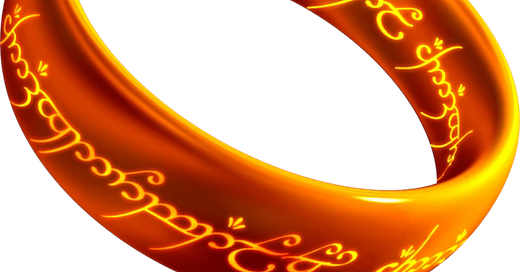Dad,
“We tell ourselves stories in order to live,” wrote Joan Didion at the opening of her essay, “The White Album.” On this much everyone agrees: Didion, you, me, Yuval Harari, Jonathan Haidt. “We look for the sermon in the suicide,” Didion went on, “for the social or moral lesson in the murder of five. We interpret what we see.”
The great question is whether the reverse is also true—whether we live out the stories we go on to tell. We look back on a jumble of experiences and see a beginning, middle, and end—we see a meaning. Do we impose that meaning, or find it waiting for us there?
I take it that the Book of Genesis—uniquely, by the way, among the creation stories of the ancient world—presents the meaning as having been spoken into existence from the beginning. In fact the stories we tell, the way we look back on things, can be closer to the full truth than the chaotic stream of events we see rushing by us in the moment.
“When you and I met,” says the poet Hyoi in C.S. Lewis’s Out of the Silent Planet, the meeting was over very shortly, it was nothing." But that’s not all: “what will it be when I remember it as I lie down to die, what it makes in me all my days till then—that is the real meeting..... You say you have poets in your world. Do they not teach you this?”
They used to, they used to. I’m running a podcast series on Virgil’s Aeneid, and this week I was explaining about “ring composition”—the narrative technique where a story begins and ends with the same theme. Once you know about it, you see it everywhere. It’s in Harry Potter, Star Wars, epic poetry, and yes, the Bible—the story of Noah is one famous example.
Now, either we keep telling stories like this because it happens to scratch some primal mammalian itch in our hindbrains, or because it reflects something satisfyingly true about the structure of the world. My money’s on the latter. A painter looks out on a magnificent landscape and frames it just so, to maximize its beauty. Did he create the landscape? Of course not. He only drew from it the form and order waiting there for his eyes to see.
In much the same way, a storyteller finds in life certain patterns, one of which might be the ever-present exile and return—a feeling, let’s say, that something missing from the past will be restored in fuller glory when the story ends. All people everywhere have been haunted by that dream, that story we keep on telling: Eden lost, paradise regained.
And at the core of every great ring composition, the hinge at its center, the theme repeats again in miniature: a man on a cross, an empty tomb. We tell ourselves stories in order to live. But faith means believing the story is true.
Love,
Spencer






As a writer, a journalist-this piece too awakens something in me. Madeline L'Engle put it best for me: "I who live by words, am wordless when I try my words in prayer. All language turns to silence..."
This is beautiful, Spencer. Powerful. That last line…whew! The whole essay feels like a revelation and a comfort. Thank you.